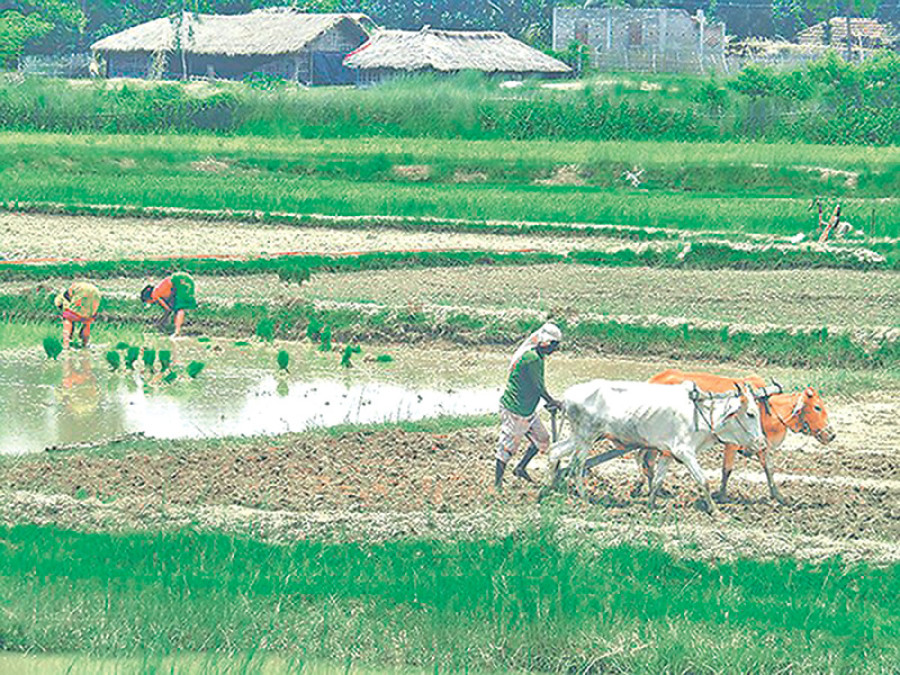Money
Bhojpur farmers vexed by falling productivity
The productivity of vegetable and cereal crops in Bhojpur has been dropping due to over dependency on subsistence farming practices and deteriorating soil health. The concerned authorities have also failed to teach farmers to increase production and productivity.
Bidhya Rai
The productivity of vegetable and cereal crops in Bhojpur has been dropping due to over dependency on subsistence farming practices and deteriorating soil health. The concerned authorities have also failed to teach farmers to increase production and productivity.
Although farmers have long been attempting to abandon traditional ways of farming, they have not been able to obtain support and motivation to switch to modern agricultural techniques that could increase their income through higher productivity.
Jamuna Dangal of Salpasilicho, Kulung has been cultivating paddy, maize, millet, buckwheat and potato on her field. Production of all crops has been dropping significantly for some years, she said. Farmers said that they had been applying the same growing practices, but cereal output has dropped compared to what they used to harvest in the past.
“We have been facing pest infection repeatedly,” she said. She is anxious that reduced production might put her livelihood which depends on farming at risk in the future. This year, her orange orchard did not yield as many fruits as expected.
Another farmer Chamal Biswakarma is facing a similar problem. The income she earns from farming is barely enough to feed her family.
Locals have informed the District Agricultural Development Office several times about the issue of soil productivity. The office sent a junior technical assistant (JTA) to the village. The JTA collected some soil samples for testing but has not returned since.
In the past years, her village used to have a good potato production. “Nowadays, problems like rotting and rupturing of tubers, and yellowish specks on the leaves and plants have become common,” said Biswakarma.
Machindra Bahadur Rai, a farmer, said that the agricultural office had been turning a deaf ear and had not been looking into their problems seriously. “We desire to switch to commercial farming but we lack the necessary knowhow.” He added that locals had been asking the agriculture office to conduct soil tests and provide them with necessary training.
“The government does not provide motivation to produce more,” said Amrita Rai, a resident of the southern part of Hatuwagadhi. Farmers of Arun Municipality have been facing similar problems.
Tika Thapa, a local resident said, “We need advice about farming in accordance with the terrain, soil and climatic conditions.” This area is famous for almonds and tobacco, but cultivation techniques are outdated.
Records at the agriculture office show that 29 JTAs have been dispatched across the district to listen to farmers’ concerns and solve them.
The government has started a ‘one village, one JTA’ programme too. However, farmers said that no JTA had visited their village even though six months had passed since the government started the scheme.
After the local level elections, JTAs have come under the jurisdiction of municipalities and rural municipalities.
Local bodies are responsible for paying the salaries of JTAs, but they have not been sent on field visits.
Instead of working in the villages, JTAs have been engaged in their personal work.
Several ward chairpersons have assigned JTAs to perform tasks like processing birth certificates which is not included in their job description. Temporary JTAs have been performing official tasks at the ward offices.
Yukmani Bhattarai, an official of the district agriculture office, said that a budget of Rs852,000 has been allocated annually for improving soil quality in all nine wards. More than Rs1.19 million has been allocated for training under the Prime Minister Agricultural Modernization Project and various programmes have been launched to promote potato, vegetable and spice cultivation.
Mira Rai, deputy mayor of Uttari Shadananda Municipality, Dingla Bazaar, said they had been making preparations to effectively address the long-standing problems of farmers.




 9.6°C Kathmandu
9.6°C Kathmandu















